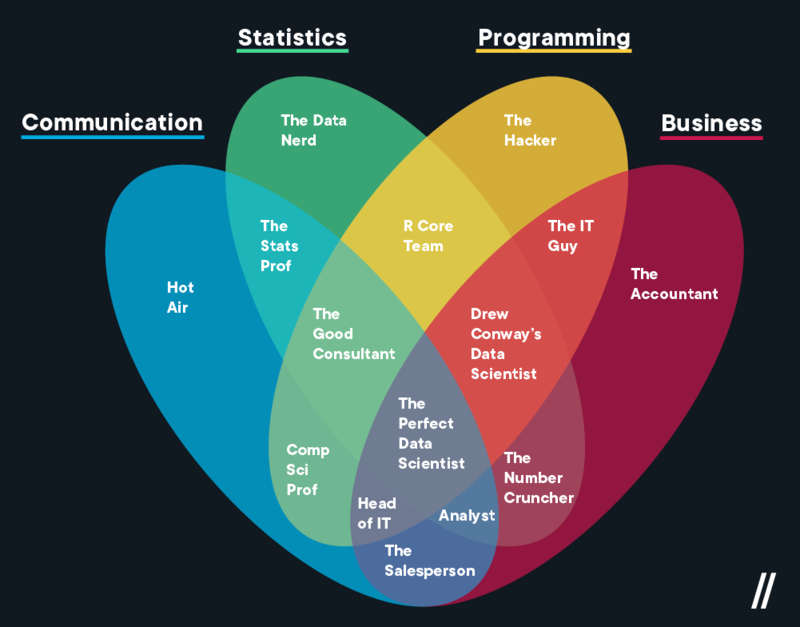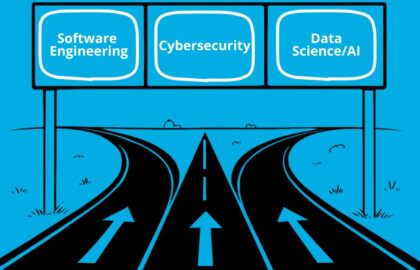Data scientists are some of the most coveted roles in any company, and their popularity — and demand — are both skyrocketing. Aside from crunching big data to enable (very cool) things like artificial intelligence and advanced medical research, data science has stretched into the private sector as companies look to data as a decision driver.
And though most data scientists have a Master’s or Doctorate degree, more than 25% of data scientists have a Bachelor’s degree or less. In other words, there are many paths to becoming a data scientist — not just the popular “get your STEM Master’s.”
To truly discover how to become a data scientist without a degree, we have to back up and look at what data science is and what data scientists do. The career of data scientists often gets confused with data analysts and data statisticians — spoiler alert: they’re slightly different. We’ll also need to look at some of the skills that data scientists need and how to learn them.

What is data science?
Data science isn’t a physical product — it’s a broad term given to studying behaviors, topics, and trends. Data science has a lot of definitions, but it’s best to think of it as a multidisciplinary approach to find stories, insights, and patterns from large data sets. Then cleaning and organizing this data in a way that makes sense so you can act on it.
And now, data science is everywhere.
If you’ve uploaded a photo on Instagram recently, if you’ve sent a Snap using Snapchat to one of your friends, or if you left a comment on a YouTube video today — those actions were collected and added to a data set that data scientists are using to make decisions. The ads you get for how to start a business course, the Hulu recommendations for what new TV show to binge-watch, and the product recommendations you get from Amazon are all a product of data science.
Data scientists are taking your actions, organizing them with your other actions and the actions of others, finding patterns, and creating an action (in this case, a recommendation) based on that data.
Data science is also a broad term used to describe many, more specific subcategories such as data engineering, data mining, mathematics, statistics, advanced computing, and model visualization. It’s also the keystone of artificial intelligence, machine learning, and deep learning.
What do data scientists do?
As we mentioned, data scientists use mathematics and programming to collect, clean, and explain data. Their main role is to adjust statistical and mathematical models applied to acquire data. In other words, they make data discoveries.
In a world where every action is collected, data scientists are more important than ever. When applied to business decisions, data scientists have a few concentrations:
- Data scientists turn formal business problems into data questions, so those business problems have data-driven answers.
- They communicate data to less-technical team members and stakeholders through data visualization.
- Data scientists often take other titles, like data architects, data engineers, machine learning engineers, and analytics managers.
But what separates data scientists from the rest of the pack is their ability to code. Data scientists are experts in programming languages like Python, R, SQL, and more.
Are data scientists different than data analysts and statisticians?
Data scientists often get confused with data analysts and statisticians, and though their work is similar, there are some main differences:
- Data analysts are the overseers of a company’s data, helping team members understand it and use that data to make data-driven, strategic decisions
- Business analysts play a strategic role, focusing on using that data housed by analysts to find problems and find solutions
- Data scientists, on the other hand, use that data by sifting through it and organizing it to find weaknesses and trends, creating predictive models based on that data
One of the biggest — if not the biggest — differences between analysts and data scientists is salary. Data scientists average much higher salaries, plain and simple, because of their technical skills.
While both careers are derived mainly from working with data, a data analyst acts more like a translator, and becoming a data analyst requires less techinical ability. In contrast, a data scientist acts in a hybrid capacity, helping companies turn data into something practical and usable through coding. Analysts and researchers have been around long before “data” existed, which is partially why data scientists often get confused with data analysts.

What skills do data scientists need?
There are many complicated skills that data scientists need, and without a degree, it can become difficult to learn, but it isn’t impossible. Not even close. We’ll help you uncomplicate the skills required.
Strong math comprehension
Math is necessary in data science — unsurprisingly.
Calculus
Calculus is vital, but it’s only essential to understand calculus principles and how those principles affect your data models. Knowing derivatives is more of something you’ll need to understand rather than compute.
Linear algebra
Linear algebra is also an excellent subject to touch upon, but as before, it’s not essential to know every little thing about algebra — just knowing how to solve a variable will help when it comes to coding and performing other tasks.
Statistics and probability
There is one domain you’ll need to be very well versed in, though, and that’s statistics and probability. A strong background isn’t required, though — learning enough will be almost similar to trial-and-error, and you’ll learn more through experience. The advantage here is that most of the concepts within statistics aren’t hard to grasp! It just takes time.
Further reading: How Much Math Do You Need to Become a Data Scientist?

Data science programming languages
Programming and coding is a general skill that can help a data scientist in various ways — having a familiar background within programming languages can help.
- R is a programming language created specifically for statistical computing and graphic tasks
- Python is a general-purpose programming language that is used for data manipulation and repeated tasks—the language is more commonly used and has a broader application than R
- SQL, Structured Query Language, is relied on by industries to extract data for analytics and reporting purposes—it’s designed for managing data in relational database management systems
- Hadoop is a suite of technologies for managing data and executing programs in a cluster – a collection of networked computers running within a data center. Hadoop equips a file system designed for the needs of extensive data
- Spark is a system, rather than a language, used for writing parallel programs to run in clusters. Spark has gained popularity for its higher efficiency on many problems and applications. It also has a rugged, machine-learning library compatible with R, making it popular amongst data scientists.
The list continues, but don’t let it intimidate you — knowing every single language inside out isn’t required, and many data scientists are more expert in some than others. Familiarity with each, though, is often expected.
Machine learning
Although machine learning sounds intimidating, it is merely how computers can learn, and improve at, tasks without being explicitly and manually programmed. Data scientists can use machine learning techniques to make decisions and predictions based on data, and it has many applications and use in the field of data science.
Other skills
A/B testing is generally a skill that should be learning but not mastered (unless requested by your work). In a general sense, A/B testing is a process of showing two types of the same web page to different audiences simultaneously to see which one earns more conversions and interactions.
Along with statistics, linear regression is a skill that should you should be familiar with before entering a data scientist’s career. In a simple sense, linear regression is just to see how close data points line up with a “line of best fit.” From this regression line, you can see how data points compare with each other while also seeing where the trend is going or how it’s changing.
So how do you learn data skills without getting a degree?
Becoming a data scientist without a Master’s degree or Doctorate degree is both possible and, frankly, not entirely rare. As we mentioned earlier. more than 25% of professional data scientists do not have a Master’s or Doctorate.
Those that don’t have those degrees probably took one of three routes on the way to their data science career. Either they self-taught themselves everything they need to know, started in a more accessible role like data analytics, or attended a data science bootcamp.
These are the three paths we’d recommend as you work your way toward a data science career, and each comes with different pros and cons.
At Flatiron School, we always recommend that students think long and hard about what what their learning style is before selecting an education path. Do you tend to work better in groups or alone? In person or remotely? Quickly or slowly? Hands-on or reading or both?
There are many ways to learn, and everyone is slightly different. While considering which path to take — teaching yourself, attending a data science bootcamp, or learning data analysis skills and working your way up always keep in mind the teaching style that fits your learning style.
Path 1: Self-teaching
Educating yourself without a teacher is hard, which is why not many people do it. We liken it to regularly exercising: you can buy the best shoes and make the best workout plan, but if you can’t keep yourself disciplined enough to run every day, you aren’t going to get in shape.
Self-teaching requires extreme discipline, as well as thorough research to make sure you’re teaching yourself the right skills. In a world evolving as quickly as data and tech, we recommend making some checkpoints for yourself to reassess your curriculum often. That way, you stay on track with new and relevant skills.
Of course, this won’t be an issue if you’re learning full-time for 6 month, but if you’re learning over the course of a few years, these checkpoints are absolutely critical.
Fortunately, for anyone interested in teaching themselves to become a data scientist, there are plenty of books and online resources dedicated to getting started.
Introduction to Data Science from Alison
A free online intro course. You’ll cover machine learning and data models, as well as typical processes like the scientific method and algorithms. It’s roughly 3 hours of curriculum.
Dataquest: Learn R, Python and SQL for Data Science
Another free intro course that covers the basics of data science.
Free Data Science Bootcamp Prep
Flatiron School’s introductory data science course covers Python and machine learning. It is the beginning modules of our full-time data science course.
Here are some other resources to help round out your data science educations.
- If you want to explore various articles related to the history and uses of Phyton, check out this free Python for Dummies resource
- Want to learn SQL? Start with w3school’s Introduction to SQL or even Udacity’s Learn SQL course
- For more resources, check out Codecademy’s Data Science resources, career paths, and skill paths. They also have a few more statistics courses to familiarize yourself with some of the math topics related to data science.
- Reading My Journey to Self-Taught Data Scientist is also a great read and incentive to keep your drive strong
Lastly, here’s a list of some of the best books and smaller courses — some free — to introduce yourself to data science:
- Summer Tech Must Read for Data Science
- Data Science Books
- Professional Certificates within Data Science
- Data Science Specialization
- Data Science Foundations
The pros of self-teaching
- Little-to-no cost to you, most of the time
- Learning at your own pace and on your own schedule
- Struggling or find something interesting? Go more slowly and deeply on that subject
- Unbiased materials from multiple sources
- Learn using the methods that you prefer (book, online, videos, slideshows, etc.)
The cons of self-teaching
- It’s hard to stay disciplined
- No career services support or guidance once you’re learned what you need to know
- Uncertain if the right material is learned
- No experts to advise your learning
- Hiring managers may not consider it a valid education
- No portfolio to showcase when interviewing
Path 2: Data science bootcamps
College courses will typically provide you with a more philosophical and a more prolonged approach/education than teaching yourself, though not as philosophically well-rounded as a post-grad degree.
Unlike with self-teaching, bootcamps are sure to teach you the skills necessary to succeed at a data scientist today. Some bootcamps, like Flatiron School, work with employers and hiring companies to understand what they need from data experts, and creates their curriculum around those needs.
The biggest difference between self-teaching and bootcamps is, well price.
Data science bootcamps can cost anywhere from $5k to $20k, and vary in pace. Some are a few weeks (though these very likely will not teach you enough skills you need to land a data science role) to 6 months.
Bootcamps also give you hands-on data science projects so you you’ll graduate with a full portfolio to showcase your skills for recruiters during the interview process.
If you decide to go the bootcamp route, we suggest considering a few things:
- What teaching style do they use? Is it hands-on labs? More book-oriented? Select a bootcamp that matches your style.
- What do they teach you? Python? R? SQL? All 3? Do your research into what languages are used for, then compare that with your career goals. Choose a bootcamp that teaches the skills that match your ambitions.
- What are their placement rates? How many of their graduates successfully land jobs, and how much do they get paid? All bootcamps should be open and honest about these numbers — you deserve to know that you’er investing in a bootcamp that will provide a good education and has paid off for students in the past. Any bootcamp that doesn’t provide this data clearly upfront might be worth avoiding.
At bootcamps, your education isn’t a pass or a fail; you get a more hands-on approach.
We recommend the following in-person data science bootcamps for their quality education and reasonable tuition fees. It’ll be a steep price, but once you land that data science role, it’ll be well worth it.
Flatiron School’s data science course
Flatiron’s course teaches you all the skills you need to become a data scientist in as little as 6 months. Our curriculum covers Python, SQL, statistics, A/B testing, linear regressions, combinatorics, probability theory, statistical distributions, Bayes Theorem, sampling methods, hypothesis testing, model evaluation, and more. Our course is offered in person in New York, Chicago, San Francisco, Seattle, and Washington, D.C.
What are some pros of coding bootcamps?
- Hands-on, applicable skills in a short-time provides a faster way to learn data science
- Knowing and learning the right material
- Focused on getting you a career as a data scientist
- More affordable than most universities and can be done part-time
- Many bootcamps have career services and job search assistance—professional, ready-made network
- Connect with other data scientists
- Know the latest market/employer needs
- Hiring managers favor Bootcamp graduates, especially compared to self-taught scientists
What are some cons of coding bootcamps?
- High-cost upfront, at once
- Intense, long hours for a few months
- Lack of access to FAFSA or other federal financial aid
- Less philosophical background than computer science degree programs
- Less in-depth than traditional college students
- Can be fast-paced
- There are still managers who prefer computer science degrees over bootcamp
How do you get a job after learning the data science skills you need to know?
We’ll outline simple steps for you to get a job as a data scientist after you’ve self-learned all of the skills listed above. This can be harder if you’re working on your own rather than working with a career coach or a career service team. People often think learning the skills you need is the entire story, but it’s just the beginning for most people.
Effective job searching and marketing yourself is vital and is often the most prominent reason someone does or doesn’t get a job offer.
Seriously, we cannot emphasize enough how much performing your job search effectively is.
For an effective job search, try these steps:
- Build a robust job-search foundation
- Write resumes and cover-letters effectively while including your self-learning
- Create your professional brand and market yourself on LinkedIn, Twitter, GitHub, blogging, etc.
- Network offline as well as online
- Efficiently apply to jobs—applying to one appointment a week isn’t enough most of the time
- Prepare for interviews, both culturally and technically, and communicate well via email, phone, and in-person
- Most importantly, maintain a healthy search/work/life balance—stress is the last thing you want
How do you become a data scientist without a degree?
- Identify your goals – Ask yourself, “what type of specialty do you want to focus on?”.
- Figure out how you want to learn – Self-teaching is valid, but bootcamps are generally better.
- Learn, learn, learn, learn, work hard, and learn – Stay committed to learning no matter what. If you teach yourself, great! If you go to a bootcamp, also great! Obviously this is the most important step of the way, so do not take any shortcuts, and dedicate yourself to a full understanding of data science.
- Build your online presence – Consider writing articles to show off your new expertise.
- Reach out to your network and support systems – Just graduated? Referrals and connections are often the best way to land an interview.
- Continue learning during your job search – You can never know too much—there’s always something to learn, still. Bootcamps are tough, but so is self-learning, so your education and career are up to however much effort you want to put in. The payoff is life-changing. Futher reading: How to Land a Tech Job: The Complete Curriculum
- Don’t give up – You might not land a job right away, but don’t think that you’re not good enough to become a data scientist—if you know the skills, you’re qualified.How to Become a Data Scientist Without a Degree
If you plan on going the bootcamp route, Flatiron School’s data science course teaches you all the skills you need to start a career as a data scientist or data analyst. This course is also available fully online.




